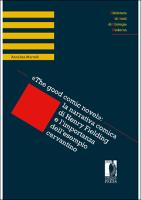«The good comic novel»: la narrativa comica di Henry Fielding e l’importanza dell’esempio cervantino
| dc.contributor.author | Martelli, Annalisa | |
| dc.date.accessioned | 2022-05-31T10:36:33Z | |
| dc.date.available | 2022-05-31T10:36:33Z | |
| dc.date.issued | 2021 | |
| dc.identifier | ONIX_20220531_9788855184762_941 | |
| dc.identifier | OCN: 1325942171 | |
| dc.identifier.issn | 2420-8361 | |
| dc.identifier.uri | https://library.oapen.org/handle/20.500.12657/55657 | |
| dc.language | Italian | |
| dc.relation.ispartofseries | Biblioteca di Studi di Filologia Moderna | |
| dc.subject.other | Fielding | |
| dc.subject.other | Cervantes | |
| dc.subject.other | influence | |
| dc.subject.other | parody | |
| dc.subject.other | novel | |
| dc.subject.other | comic | |
| dc.title | «The good comic novel»: la narrativa comica di Henry Fielding e l’importanza dell’esempio cervantino | |
| dc.type | book | |
| oapen.abstract.otherlanguage | «The good comic novel». La narrativa comica di Henry Fielding e l’importanza dell’esempio cervantino analyses the influence of Don Quixote on Henry Fielding’s fiction, starting with a survey of the reception of the Spanish novel in England. Joseph Andrews and Tom Jones are analyzed and compared with the Spanish novel, from which Fielding overtly borrowed some characters, episodes, and Cervantes’ parodic strategies. Fielding’s and Cervantes’s narrative proceeded from the parodic deconstruction and subsequent innovation of previous literature, with the main purpose of teaching and amusing the reader at the same time. Finally, the volume examines the role of Fielding and Cervantes in the rise of the fictional and the self-conscious novel. | |
| oapen.identifier.doi | 10.36253/978-88-5518-476-2 | |
| oapen.relation.isPublishedBy | bf65d21a-78e5-4ba2-983a-dbfa90962870 | |
| oapen.relation.isbn | 9788855184762 | |
| oapen.relation.isbn | 9788855184779 | |
| oapen.series.number | 62 | |
| oapen.pages | 174 | |
| oapen.place.publication | Florence |

